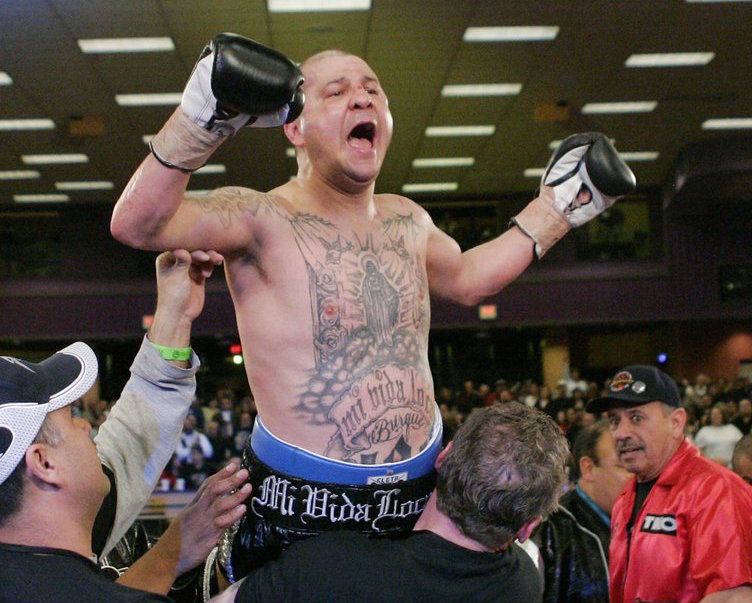
FILE – In this Feb. 23, 2007 file photo, Johnny Tapia, from Albuquerque, N.M., is carried around the ring after his majority decision over Evaristo Primero, from El Paso, Texas, in a 10-round bout at Isleta Pueblo, N.M. Tapia was hospitalized in critical condition Monday, March 12, 2007, after an apparent cocaine overdose,. (AP Photo/Jake Schoellkopf)
Johnny Tapia was never going to make it alive into the International Boxing Hall of Fame.
He had way too many addictions, way too many demons. The only place Tapia ever felt peace was in the ring itself.
“Johnny always said that when my career is over I don’t know what I’m going to do with myself and I probably won’t last long,” his widow, Teresa, said. “He lasted one year from when he quit boxing.”
There was never really an official cause of death. Tapia’s heart simply stopped beating and, unlike his previous brushes with death, this one was for real.
Tapia himself never thought he would live past the age of 40. He reached 45 before his tormented life finally came to an end at his home in Albuquerque, New Mexico.
“He was full of life and was training still,” Teresa Tapia said. “We know he abused his body with drugs but he was clean from cocaine. Unfortunately he was taking prescription medication at the time, but it was because everything in his body was broken.”
On Sunday his widow will stand in his place as Tapia joins a Hall of Fame class that includes Evander Holyfield and Marco Antonio Barrera in Canastota, New York. His induction comes five years almost to the day that he was found dead in his home.
It will be a bittersweet moment for Teresa. She will give the acceptance speech her late husband is not around to make, and their three sons will be there to add support.
There will be cheers, which Tapia loved. And there will be plenty of people, which he loved, too.
“Johnny just genuinely loved people, no matter who they were,” Teresa Tapia said. “When he got in the ring it was more than just salvation for him, it was his way to give back to the fans. His whole life was about people.”
It was a life that started without the most important person, his father, who was killed before he was born. At the age of eight he watched as his mother was stabbed 26 times with a screwdriver and left to die.
“I was raised as a pit bull. Raised to fight to the death,” Tapia wrote in his 2006 autobiography “Mi Vida Loca.” ″Four times I was declared dead. Four times they wanted to pull life support. And many more times I came close to dying.”
One of those times was on his wedding night, when Teresa found him overdosed in the bathroom, a needle in his arm. Tapia battled drugs and he battled alcohol, but never had the winning record against them that he had in the ring.
His life wasn’t just crazy, it was tragic. In 2007 he was hospitalized with a cocaine overdose, and his brother-in-law and nephew were killed in a car accident on their way to Albuquerque to see him.
A stint in prison cost him four years of his boxing career. A suspension for cocaine use cost him three more.
Through it all he fought, sometimes magnificently, winning three different titles starting at 115 pounds. He fought with showmanship and he fought with raw anger, winning 59 fights against five losses and two draws.
But he couldn’t stay clean, couldn’t stay out of trouble. It was never really a question of how badly his life would end, but when it would end.
“He was so open about his problems that sometimes people gave us grief about that,” Teresa Tapia said. “Yes he did drugs, but Johnny always said he never asked to be a role model. He said don’t look at me, just pray for me. He didn’t want others to fall for what he did. He was very straight forward.”
That Tapia was voted by boxing writers into the Hall of Fame on his first ballot is testament to what he managed to accomplish in boxing despite his many issues. The city of Albuquerque recently named a community center in his honor, a testament to what he meant to boxing fans in that city.
Teresa Tapia said she visited the Boxing Hall of Fame with her late husband in the 1990s, and he talked about how the all-time greats like Muhammad Ali had been there.
Now he will have his own spot among them.
“This is what he wanted and how he wanted to be remembered,” she said. “In a way it makes it so he keeps on living.”